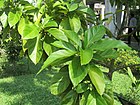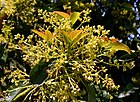Note: This is a project under development. The articles on this wiki are just being initiated and broadly incomplete. You can Help creating new pages.
Difference between revisions of "Persea americana - Avacado"
| (11 intermediate revisions by the same user not shown) | |||
| Line 1: | Line 1: | ||
| − | + | [[File:Persea americana fruit.JPG|thumb|right]] | |
| + | '''Avocado''' is a large, spreading, evergreen tree with an irregular, dense crown, that can vary widely in height according to variety. Grafted trees generally tend to be 8 - 10 metres tall. | ||
==Uses== | ==Uses== | ||
| − | {{Uses|}}, {{Uses|}}, {{Uses|}}, {{Uses|}}, {{Uses| | + | {{Uses|Suppurating Wounds}}, {{Uses|Expelling worms}}, {{Uses|Skin afflictions}}, {{Uses|Scabies}}, {{Uses|Purulent wounds}}.<ref name="Uses"/> |
==Parts Used== | ==Parts Used== | ||
| − | {{Parts Used|}}, {{Parts Used| | + | {{Parts Used|Fruits}}, {{Parts Used|Leaves}}. |
==Chemical Composition== | ==Chemical Composition== | ||
| − | <ref name="chemical composition"/> | + | It contains one previously undescribed flavonol glycoside (1) together with ten known flavonoids (2–11), four megastigmane glycosides (12–15) and two lignans (16–17) were isolated.<ref name="chemical composition"/> |
==Common names== | ==Common names== | ||
| Line 16: | Line 17: | ||
===Dravya=== | ===Dravya=== | ||
===Rasa=== | ===Rasa=== | ||
| − | |||
===Guna=== | ===Guna=== | ||
| Line 29: | Line 29: | ||
==Habit== | ==Habit== | ||
| − | {{Habit|}} | + | {{Habit|Evergreen Tree}} |
==Identification== | ==Identification== | ||
| Line 48: | Line 48: | ||
==Mode of Propagation== | ==Mode of Propagation== | ||
| − | {{Propagation|}} | + | {{Propagation|Seeds}} |
==How to plant/cultivate== | ==How to plant/cultivate== | ||
| − | <ref name="How to plant/cultivate"/> | + | Different forms of the plant can succeed in a range of climates, ranging from subtropical with occasional frosts to lowland and highland tropics, where it can be grown at elevations as high as 2,800 metres.<ref name="How to plant/cultivate"/> |
==Commonly seen growing in areas== | ==Commonly seen growing in areas== | ||
| − | {{Commonly seen|}}, {{Commonly seen|}} | + | {{Commonly seen|Humid lowland forests}}, {{Commonly seen|On limestone formations}} |
==Photo Gallery== | ==Photo Gallery== | ||
<gallery class="left" caption="" widths="140px" heights="140px"> | <gallery class="left" caption="" widths="140px" heights="140px"> | ||
| − | + | File:Persea americana fruit.JPG | |
| + | Persea americana (Avocado) tree in RDA, Bogra 05.jpg | ||
| + | Persea americana - Fruit and Spice Park - Homestead, Florida - DSC08857.jpg | ||
| + | Persea americana - Fruit and Spice Park - Homestead, Florida - DSC08860.jpg | ||
| + | Persea americana 01.JPG | ||
</gallery> | </gallery> | ||
| Line 64: | Line 68: | ||
<references> | <references> | ||
| − | <ref name="chemical composition">[ | + | <ref name="chemical composition">[https://www.sciencedirect.com/science/article/pii/S0102695X19302832#:~:text=americana%2C%20one%20previously%20undescribed%20flavonol,16%E2%80%9317)%20were%20isolated. Chemistry]</ref> |
| − | <ref name="Leaf">[ | + | <ref name="Leaf">[Morphology]</ref> |
| − | <ref name="How to plant/cultivate">[ | + | <ref name="How to plant/cultivate">[Cultivation]</ref> |
<ref name="Uses">Indian Medicinal Plants by C.P.Khare</ref> | <ref name="Uses">Indian Medicinal Plants by C.P.Khare</ref> | ||
</references> | </references> | ||
==External Links== | ==External Links== | ||
| − | * [ ] | + | * [http://www.missouribotanicalgarden.org/PlantFinder/PlantFinderDetails.aspx?taxonid=281661 Persea americana on missouribotanicalgarden.org] |
| − | * [ ] | + | * [https://www.sciencedirect.com/topics/agricultural-and-biological-sciences/persea-americana Persea americana on sciencedirect.com] |
| − | + | ||
[[Category:Herbs]] | [[Category:Herbs]] | ||
[[Category:Pages without herbs images]] | [[Category:Pages without herbs images]] | ||
Latest revision as of 12:25, 30 June 2020
Avocado is a large, spreading, evergreen tree with an irregular, dense crown, that can vary widely in height according to variety. Grafted trees generally tend to be 8 - 10 metres tall.
Contents
- 1 Uses
- 2 Parts Used
- 3 Chemical Composition
- 4 Common names
- 5 Properties
- 6 Habit
- 7 Identification
- 8 List of Ayurvedic medicine in which the herb is used
- 9 Where to get the saplings
- 10 Mode of Propagation
- 11 How to plant/cultivate
- 12 Commonly seen growing in areas
- 13 Photo Gallery
- 14 References
- 15 External Links
Uses
Suppurating Wounds, Expelling worms, Skin afflictions, Scabies, Purulent wounds.[1]
Parts Used
Chemical Composition
It contains one previously undescribed flavonol glycoside (1) together with ten known flavonoids (2–11), four megastigmane glycosides (12–15) and two lignans (16–17) were isolated.[2]
Common names
| Language | Common name |
|---|---|
| Kannada | |
| Hindi | |
| Malayalam | |
| Tamil | |
| Telugu | |
| Marathi | |
| Gujarathi | |
| Punjabi | |
| Kashmiri | |
| Sanskrit | |
| English |
Properties
Reference: Dravya - Substance, Rasa - Taste, Guna - Qualities, Veerya - Potency, Vipaka - Post-digesion effect, Karma - Pharmacological activity, Prabhava - Therepeutics.
Dravya
Rasa
Guna
Veerya
Vipaka
Karma
Prabhava
Habit
Identification
Leaf
| Kind | Shape | Feature |
|---|---|---|
Flower
| Type | Size | Color and composition | Stamen | More information |
|---|---|---|---|---|
| {{{5}}} |
Fruit
| Type | Size | Mass | Appearance | Seeds | More information |
|---|---|---|---|---|---|
Other features
List of Ayurvedic medicine in which the herb is used
Where to get the saplings
Mode of Propagation
How to plant/cultivate
Different forms of the plant can succeed in a range of climates, ranging from subtropical with occasional frosts to lowland and highland tropics, where it can be grown at elevations as high as 2,800 metres.[4]
Commonly seen growing in areas
Humid lowland forests, On limestone formations
Photo Gallery
References
External Links
- Ayurvedic Herbs known to be helpful to treat Suppurating Wounds
- Ayurvedic Herbs known to be helpful to treat Expelling worms
- Ayurvedic Herbs known to be helpful to treat Skin afflictions
- Ayurvedic Herbs known to be helpful to treat Scabies
- Ayurvedic Herbs known to be helpful to treat Purulent wounds
- Herbs with Fruits used in medicine
- Herbs with Leaves used in medicine
- Habit - Evergreen Tree
- Index of Plants which can be propagated by Seeds
- Herbs that are commonly seen in the region of Humid lowland forests
- Herbs that are commonly seen in the region of On limestone formations
- Herbs
- Pages without herbs images





